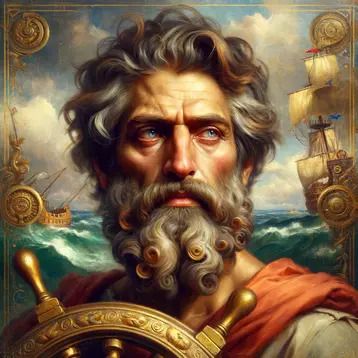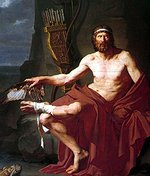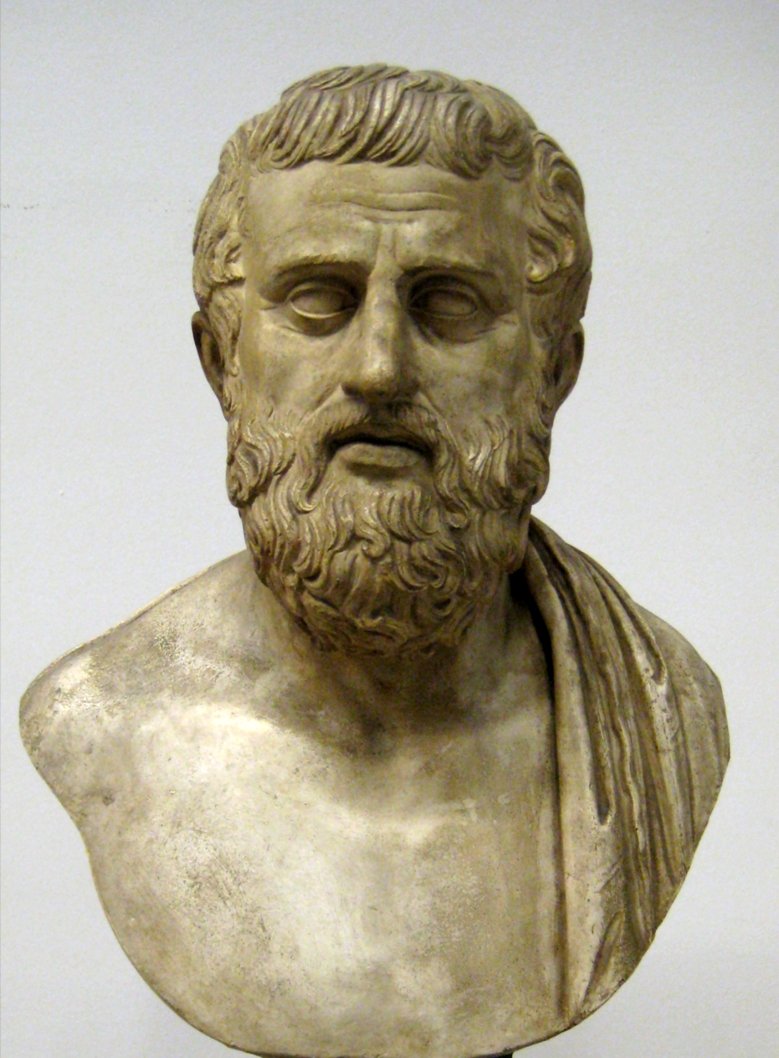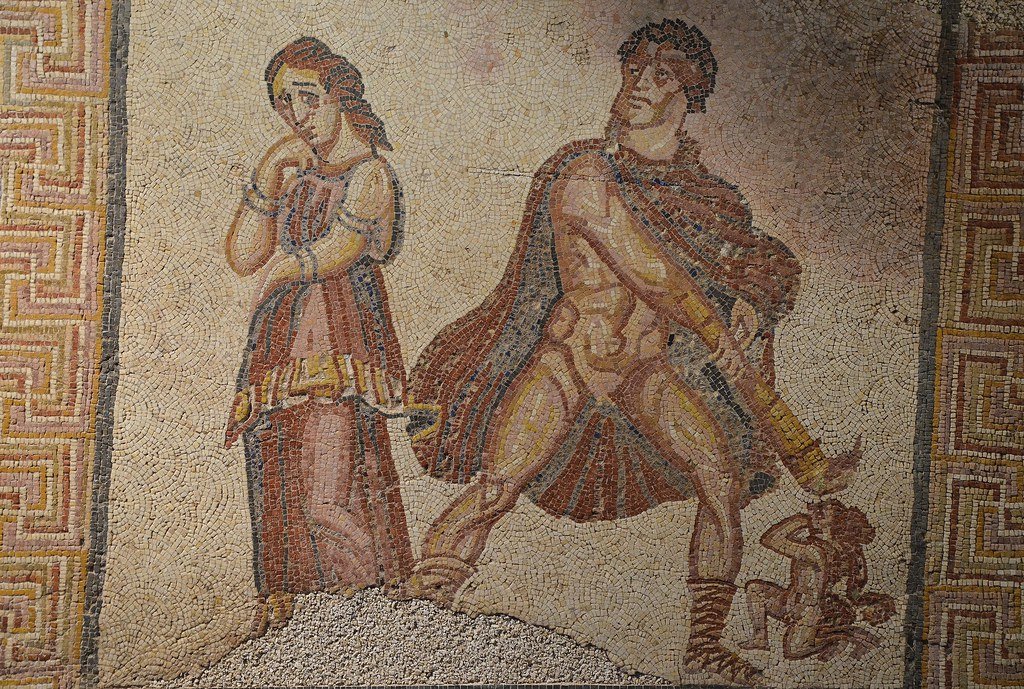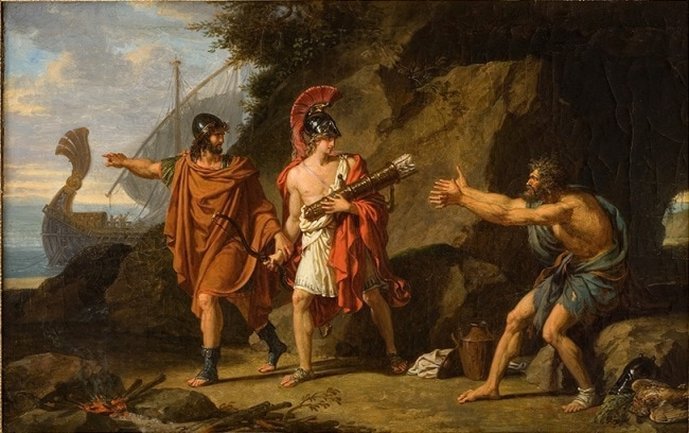
Philoctetes
Philoctetes by Sophocles
The most static and arguably least celebrated of Sophocles’ surviving tragedies, Philoctetes was first performed in 409 BC at the City Dionysia, where it won the first prize. The play is set in the tenth year of the Trojan War, shortly after the Greeks discover that, as revealed by the oracles, they need to recruit Philoctetes and make him bring the bow and arrows of Heracles to Troy if they want to win the war. So, Odysseus and Neoptolemus are sent to fetch Philoctetes from the deserted island of Lemnos, where the hero had been abandoned a decade ago with an unhealable and painful wound by none other than Odysseus and the Atreides. Odysseus expects to achieve this through deception. In accordance with his cunning plan, soon after disembarking, Neoptolemus goes alone to meet Philoctetes. He learns from him the story of his life: it is a story full of heroism and abandonment, a tale of loneliness and excruciating pain. Even though touched by the story, Neoptolemus, as per plan, lies to Philoctetes that he has reached his island after fleeing Troy and that he is now headed back to Greece. Disguised as a merchant, a sailor sent by Odysseus arrives and tells another lie: Odysseus and Diomedes are on their way to Lemnos to get Philoctetes by force. The story is meant to scare Philoctetes and incite him to leave to Greece with Neoptolemus (which is actually, once again, Troy). But soon after he agrees to do so, Philoctetes passes out of pain and, in the last act before losing consciousness, gifts the bow of Heracles to Neoptolemus, who, in turn, promises to keep it safe for him until necessary. Neoptolemus does precisely that, and, when Philoctetes awakes, tells him the whole truth. At this point, Odysseus arrives and intervenes, taking with him both Neoptolemus and Heracles’ bow back to the ship: they will find someone else to shoot them. However, Neoptolemus thinks this unjust. To the dismay of Odysseus, he returns and hands Philoctetes back his bow. He uses the opportunity to ask formally of him to join the Greek forces in Troy; Philoctetes refuses and prefers to go back to Greece. Neoptolemus, risking the anger of the Greek army, agrees to help him. At this point, in a deus ex machina denouement, Heracles (by then, already a god) appears on stage and persuades Philoctetes to leave for Troy, promising him both a cure for his wound and immortal glory, in addition to a final victory for the Greeks.
Date and Historical Background
According to an ancient argument, Philoctetes was first performed at the Great Dionysia, late in March, 409 BC. It won yet another first prize for Sophocles, who, according to tradition, should have been no less than eighty-seven years old at the time.
Characters and Setting
Characters
• Odysseus, king of Ithaca
• Neoptolemus, son of Achilles
• Philoctetes, companion of Heracles
• Merchant, a follower of Neoptolemus in disguise
• Heracles
• Chorus of Sailors from the ship of Neoptolemus
Setting
The play is set on the north-east coast of Lemnos, before the cave of Philoctetes, located inside a rocky cliff rising steeply from the sea-shore.
Summary of Philoctetes
Prologue
Odysseus and Neoptolemus have just landed on the deserted island of Lemnos where they have been sent by the Atreides to fetch Philoctetes and bring him back to Troy. Many years ago, Philoctetes was the only one brave enough to light the funeral pyre of Heracles, and, as a gift, the greatest of all heroes handed him his legendary bow and arrows. Unfortunately, soon after the beginning of the Trojan War, Philoctetes received a terrible wound on his foot the sight and smell of which was so unbearable that the Greek commandeers (the Atreides and Odysseus) decided to abandon him and leave him alone on the island of Lemnos. Now, a decade later, they desperately need his help: according to an oracle, bringing Philoctetes and Heracles’ bow to Troy are the two prerequisites for the Greeks to win the war against their famous rival.
At the beginning of Sophocles’ play, Odysseus shares parts of this story with Neoptolemus, the young son of Achilles. Since, due to his involvement in these previous events, Odysseus can't face Philoctetes (at the least, it would be counterproductive), Neoptolemus must go to him alone and try to persuade him to join the Greek forces at Troy. The only way to achieve this is through deception.“Tell him,” says Odysseus to Neoptolemus, “you are sailing homeward, and have left the fleet of the Achaean warriors, after coming to hate them with unbounded hatred...” He advises him to reserve his vilest insults for the Atreides and himself, since the three did Philoctetes the most harm, and, that way, he should incite the strongest empathy from Philoctetes. The second part of the plan includes Odysseus sending a sailor in disguise to work Philoctetes’ mind some more.
Neoptolemus doesn’t want to lie and, at first, refuses to participate in the ploy, but, after some convincing from Odysseus, he unwillingly accepts the proposal. After all, it is either that or a defeat at Troy. As Odysseus departs to the ship, Neoptolemus heads to Philoctetes’ cave.
Parodos (Entrance Song)
At this point, the Chorus, composed of fifteen sailors from the ship of Neoptolemus, enters the stage. “Show us the way!” they say, “tell us how we may serve you.” As Neoptolemus starts giving them instructions on how they should act, Philoctetes suddenly appears.
First Episode
“O strangers!” he exclaims, “Who can you be, and from what country, that you have put into this harborless and desolate land? What would I rightly say is your city or your ancestry?” Philoctetes is glad to learn that the strangers are, in fact, Greeks, and even gladder to find out that their leader is the son of a man he loved and cherished, Achilles. Now that the strangers have stopped being strangers, Philoctetes feels free to tell his story at some length, and, as agreed upon with Odysseus earlier, Neoptolemus relates his false tale as well. “It seems that you have come to me, friends, well commended by a grief that matches my own,” he answers, as expected. “Your story is in harmony with mine, so that I can recognize the work of the Atreides and of Odysseus.” Finding someone he can trust, Philoctetes asks Neoptolemus to take him home. The sailors back the demand, and Neoptolemus consents.
They are preparing to leave when two men arrive from the coast: it is evidently time for the second part of Odysseus’ plan. One of them, after introducing himself as a merchant trading in wine, warns Philoctetes that Odysseus and Diomedes are sailing toward Lemnos to fetch him and bring him to Troy. When the sailors leave, Philoctetes expresses his anxiousness to leave as soon as possible to Neoptolemus. The two enter Philoctetes’ cave to obtain some necessities.
In the first stasimon, Neoptolemus’ sailors express their pity for Philoctetes, comparing his fate to that of Ixion, despite Philoctetes being just an innocent victim of the gods.
Second Episode
As soon as Philoctetes steps outside of his cave with Neoptolemus, he is seized with pain so unbearable that he is all but sure that his hour has come. Yet, he tries to hide the agony, and this heroic act moves Neoptolemus, still there only to trick Philoctetes, and bring him to Troy rather than to Greece once he has him on board. Neoptolemus is moved doubly when Philoctetes gifts him his bow and arrows and asks him to never hand it, willingly or unwillingly, to his enemies. Neoptolemus pledges to remain faithful to this oath, and, moreover, to not leave without Philoctetes. At that moment, Philoctetes falls unconscious due to the pain in his foot.
In the kommos (lament) which follows—in place of the second stasimon—Neoptolemus’ sailors invoke the God of Sleep and ask of him happy and joyful dreams for Philoctetes to relieve him from his sufferings. Then, they turn to Neoptolemus and advise him—now that he has Heracles’ bow in his hands—to desert the sleeping man, and leave for Troy as soon as possible. No, replies Neoptolemus, sailing without him is not an option. Bringing Heracles’ bow to Troy means nothing if he is not there to shoot it! “His must be the victor's crown,” he adds. “It is he that the god commanded we bring. It would be a foul disgrace upon us to boast of deeds in which failure and fraud had equal parts.”
Third Episode
Philoctetes awakes, pleased that Neoptolemus has kept to his promises. After thanking him warmly for that, he expresses his readiness to head off to the ship. “God! What am I to do next?” exclaims Neoptolemus, torn between the objective of his mission and the newfound feelings of respect and pity for Philoctetes. Troubled by shame and remorse, Neoptolemus decides to tell the truth: “I will conceal nothing,” he says, “You must sail to Troy, back to the Achaeans and the forces of the Atreides.”
Unsurprisingly, Philoctetes feels betrayed and demands his bow back, but Neoptolemus refuses to part company with it. “I bewail the treacherous treatment I have received from the son of Achilles,” shrieks Philoctetes in tears. “Although he swore to take me to my home, it is to Troy that he takes me. Although he gave me his right hand in pledge of his word, he has taken my bow, the sacred bow, once belonging to Zeus's son Heracles, and he keeps it and wants to show it to the Argives as his own. By force he drags me away, as if he had captured a strong man, and does not see that he is cutting down a corpse, the shadow of smoke, a mere phantom.” Shaken to his very core, Neoptolemus has second thoughts. And, indeed, he is about to return the bow to its rightful owner, when, suddenly, Odysseus appears from a hiding-place near them and prevents him.
Now that his ploy has failed, Odysseus threatens Philoctetes to take him by force. On hearing this, Philoctetes heads to the cliffs determined to throw himself to his death, if that is the only way to prevent his arch-nemesis from successfully completing his mission. The attendants seize him just on time, and Odysseus, who has had it just about enough, says to him that, if he doesn’t want to leave, he is free to stay in Lemnos. They will take the bow and the arrows, though. “We have no further need of you,” says Odysseus, “now that we have these weapons. For Teucer is there among our forces, well-skilled in this craft, as am I, and I believe that I can master this bow in no way worse than you, and point it with no worse a hand.” Odysseus leaves and orders Neoptolemus to follow; in turn, Neoptolemus, on going away, orders his sailors to remain with Philoctetes: in case he ever changes his mind.
In the second kommos (which stands in place of the third stasimon), the sailors remind the grieving Philoctetes that he is not entitled to so much sorrow over his destiny because it is he who has chosen to endure his pain in Lemnos rather than sail away to Troy and earn glory. Philoctetes angrily chases the sailors away and proclaims that he would rather kill himself—asking the Chorus for some weapon as a farewell gift.
Exodos (Exit Song)
As the sailors prepare to leave, Neoptolemus suddenly comes back, followed by the confused Odysseus. “What are you planning to do?” Odysseus asks. “I come to undo the mistake that I made earlier,” replies Neoptolemus, “and return the bow to the one I took it from.” Odysseus is furious: he angrily reprimands Neoptolemus and threatens to denounce his treason to the Greek army. Nothing seems to have an effect on the son of Achilles: he is determined to make amends with Philoctetes and confident that justice is on his side.
Odysseus pretends to leave when in fact he hides yet again. Neoptolemus calls Philoctetes from his cave and gives him his bow. Odysseus intervenes a second too late: the weapon is now in the hands of his rival who is about to shoot an arrow at him if not for Neoptolemus’ intervention. Odysseus leaves and is not seen again.
Now that Neoptolemus is alone with Philoctetes, he reveals to him the whole truth, including the oracles which urged the Greeks to come for him. Philoctetes learns that, if he sets sail to Troy, it has not only been prophesied that he would make a name for himself but—even more importantly—that his wound would be healed. Even so, Philoctetes is unwilling to serve the Atreides. “Let me bear the sufferings that are fated me,” he says to Neoptolemus after a brief hesitation. “But what you promised me with your right hand in mine—to bring me home—that promise fulfill for me, son.” Even though Neoptolemus is afraid that this act will incite the anger of all Greeks, he agrees to take Philoctetes to Greece.
All of a sudden, a divine shape appears on the sky above the two: it is the specter of Heracles, climbing down from Olympus to declare the will of Zeus. He promises to send Asclepius to heal Philoctetes’ wounds and informs him that it is his duty before the supreme god to head to Troy. “Ah, friend whose voice I have longed to hear, whose shape I see at long last, I will not disobey your commands!” shouts Philoctetes in agreement. As Heracles instructs the two to guard each other’s life under Troy and warns them not to offend the gods (as Neoptolemus ironically will), the play closes with the heroes moving slowly towards the ship, ready to sail away to Troy.
A Brief Analysis
“In no other Greek play does character count for so much,” write Ian Storey and Arlene Allan. And, indeed, Philoctetes is a pretty static tragedy where not much other than the discussions between the three protagonists happens. However, despite the unsatisfying deus ex machina ending, and precisely because of these well-crafted dialogues, it is still an exceptional play which explores, similarly to Antigone, the clash of three irreconcilable ethically sound worldviews.
As far as Odysseus is concerned, no individual is more important than the collective. That is why he doesn’t think it is dishonorable to trick Philoctetes into obedience, just like he didn’t think it was wrong to leave him alone on a deserted island a decade ago. Unsurprisingly, Odysseus sees Neoptolemus’ decision to apologize to Philoctetes and hand him back his bow as nothing short of treason: why should any individual matter to him more than a victory at Troy?
Since he has suffered for a decade precisely because of this attitude, Philoctetes considers the opposite as true: no collective goal should ever be more important than its individual members. After all, it was because of this that he was left behind to suffer on a deserted island, and by some of his closest friends. Now, when they need him, they are willing to traumatize him yet again. Why should they win? Philoctetes would rather kill himself than be of assistance to the ones who had treated him so unjustly.
Torn between these two radical views, sits Neoptolemus, who, just like his father, seems a firm devotee to a more traditional heroic code, according to which a collective is no better than the sum of its great man. Since he realizes that Philoctetes is one of these great men, for Neoptolemus, lying to him is not an option. As far as he is concerned, winning the Trojan War by way of deception is more dishonorable than losing it in a fair fight.
These three moral codes are so different between them that any solution must inevitably result in tragedy. Undeniably, Heracles’ appearance is the only thing which prevents it. It is worth noting here that his specter was originally played by the same actor who played Odysseus. Should we be allowed—in a freer interpretation that makes the ending both more modern and more rewarding—think of his appearance as just another, unexplained trick out of Odysseus’ sleeve?
Philoctetes Sources
There are many translations of Philoctetes available online, both in verse and in prose; if you are a fan of the latter, you can read Richard Claverhouse Jebb’s translation for Cambridge University Press here. If, however, you prefer poetry, feel free to delve into Robert M. Torrance’s blank verse adaptation here.
See Also: Sophocles, Philoctetes, Heracles, Odysseus
Philoctetes Video
Philoctetes Associations
Link/Cite Philoctetes Page
Written by: The Editors of GreekMythology.com. GreekMythology.com editors write, review and revise subject areas in which they have extensive knowledge based on their working experience or advanced studies.
For MLA style citation use: GreekMythology.com, The Editors of Website. "Philoctetes". GreekMythology.com Website, 09 Apr. 2021, https://www.greekmythology.com/Plays/Sophocles/Philoctetes/philoctetes.html. Accessed 26 April 2024.


